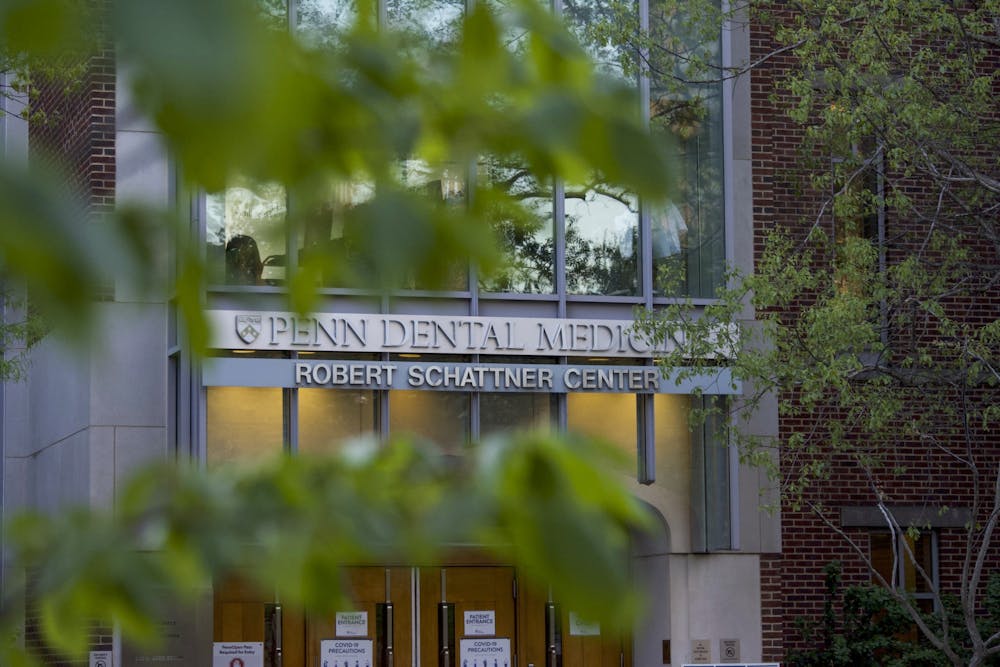
Penn Dental Medicine and Penn Nursing have announced a new dual degree program in nutritional science.
Credit: Navraj SinghThe School of Dental Medicine and the School of Nursing announced a new dual-degree program, allowing students to earn a master's degree in nutritional science.
The program, announced in January, will be conducted asynchronously and online. To earn the degree, students must take 10 courses and complete a culminating capstone project. The format is intended to ensure intellectual diversity among the participating students, according to school administrators that The Daily Pennsylvanian spoke with.
Charlene Compher, the director of graduate nutrition programs at the Nursing School, told the DP that the idea for the new dual-degree program was largely initiated by students — including undergraduates, medical students, and students from local Philadelphia schools.
“We keep getting emails from medical students who are unhappy with the tiny amount of nutrition training that they’re getting,” Compher said.
Compher added that the dual-degree program will help Penn dietitians be more professionally competitive. She noted that, by 2024, clinical dietitians will be required to have a master's degree to enter practice, and Penn’s current nutrition training in dietetics would not allow dietitians to qualify.
Kathleen Boesze-Battaglia, the assistant dean for academic initiatives at the Dental School, said there is a strong connection between nutrition and dental health. As a field, oral healthcare is continually expanding to include aspects such as systemic disease and health, she said. Nutrition heavily affects personal health, which is influenced by the oral cavity.
The Dental School recently developed a nutritional science honors program. According to Boesze-Battaglia, the M.S. in nutritional science program is the logical next step, as it takes a more comprehensive approach — particularly with its capstone project specific to oral healthcare.
As oral healthcare expands as a field, the dual-degree program aims to prepare dentists to play a hands-on role in patient interaction.
“Dentists can really build a relationship with their patients,” Boesze-Battaglia said. “They see them every six months … there is an element of trust there where you can start discussing diet and other aspects of nutritional health.”
Compher also discussed the importance of increasing intellectual diversity in the creation of the program through the asynchronous and online components. She said that students who have been interviewed thus far for the program come from backgrounds in journalism, physical therapy, pharmacy, and broader liberal arts, as opposed to strictly dentistry and nursing.
“If we are going to tackle a problem like obesity or type 2 diabetes, we need people coming at it from a whole lot of different directions with some training in common,” Compher said. “[For example,] if we have business students, they can take on angles that other people don't know of, and they could be influential.”
Compher said that the program structure may allow students from many different vantage points, such as different locations or those with hectic schedules, to participate. These students will likely participate in group study assignments where they can work on their own timelines while engaging with one another.
However, the possibility of having synchronous Zoom classes for the capstone courses at the conclusion of the degree has not been ruled out.
Uri Hangorsky, associate dean for student affairs at the Dental School, told the DP that coordinating a dual-degree program between two schools is a complex process. This requires making sure that courses do not interfere with student training from either school.
Hangorsky also discussed the many reasons why students may choose to pursue a dual degree. This includes an interest in public health with aspirations towards professional healthcare management or policy, intellectual enrichment purposes, and the financial support of completing two degrees in one.
“[This degree] goes into the mission of the University of Pennsylvania,” Hangorsky said. “Opposed to other Ivy League schools, we are a unified campus, which ensures us to interact with sister schools and enable [students] to integrate their knowledge,” Hangorsky said.
The Daily Pennsylvanian is an independent, student-run newspaper. Please consider making a donation to support the coverage that shapes the University. Your generosity ensures a future of strong journalism at Penn.
Donate







